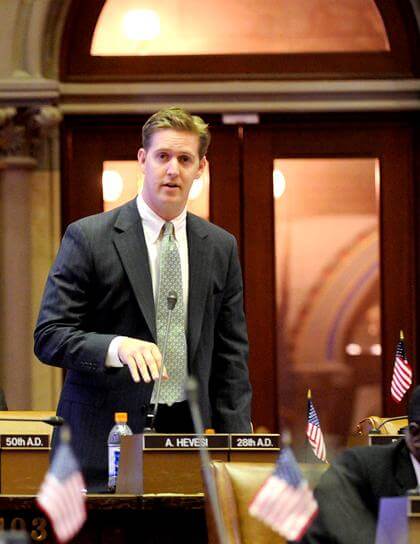By Anna Gustafson
Life seems good for state Assemblyman Andrew Hevesi.
The Democratic lawmaker just swept more than 73 percent of the vote in District 28, and he is about to head to an Albany dominated by his party for the first time in decades. His Republican opponent, Walter Schmidt, received 26 percent of the vote in the 28th Assembly District, which covers Forest Hills, Rego Park, Middle Village and Glendale.
This new Democratic dominance could mean the legislator’s bills may more easily make their way through a Senate and Assembly more sympathetic to Hevesi’s priorities, such as a piece of legislation he tried to get passed last year, which was blocked by the Republican−controlled Senate, that would require businesses to display the energy efficiency of tires for customers.
Still, life is not all roses for the assemblyman, even if he is able to get more passed by the Democratically friendly state government, like a package of renewable energy bills he plans to introduce at the end of this month.
When the Hevesi returns to Albany next week, legislators will be looking to carve more than $1.2 billion from the current state budget, and they will soon have to figure out how to fill next year’s anticipated $12.5 billion budget gap. Gov. David Paterson has recently called for a $5.2 billion budget reduction over the next 16 months, with significant cuts to Medicaid and education — a move that has angered school and health leaders throughout the city.
“These are going to be painful cuts,” said Hevesi, a lifelong Forest Hills resident. “The governor has projected a $47 billion deficit over the next four years. That’s a big number.”
Hevesi, who was just named chairman of the Renewable Energy Subcommittee, will also be expending much of his own energy this year crafting a statewide, comprehensive energy plan that would promote the use of alternative energy.
“There’s a lot of renewable resources, but we lack a cohesive statewide strategy, which means we’re not at where we could be with renewable energy,” Hevesi said.
While Hevesi expects his renewable energy bills to be passed without much fanfare, he is gearing up for a possible fight over a piece of legislation he will propose that would require every apartment building in the state to be sub−metered or individually metered.
Basically, sub−metering makes it possible for the landlords of apartment buildings that have one master electric meter to charge tenants in each separate unit for the power they use rather than dividing power costs among the residents. This, Hevesi argued, would push residents to conserve energy because they would be responsible for the exact amount of power they use.
“I believe that the days of master metered buildings, where energy can be consumed without consequence, are over,” Hevesi said.
Five other sub−metering bills he is sponsoring would make it easier to implement a sub−metering or individual metering requirement and would increase oversight of the sub−metering process, the assemblyman said.































